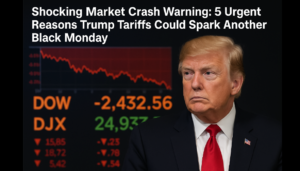Shocking Market Crash Warning: 5 Urgent Reasons Trump Tariffs Could Spark Another Black Monday
Former U.S. President Donald Trump’s decision to impose a 10% tariff on all imports has triggered fears of a global market crash. Financial commentator Jim Cramer has warned that this move could lead to a stock market meltdown reminiscent of the 1987 “Black Monday” crash, when the Dow plunged over 22% in a single day. U.S. markets already showed signs of panic, with the S&P 500, Dow Jones, and Nasdaq suffering their worst two-day performance since March 2020.
Cramer stressed that unless the U.S. reaches out to nations that haven’t retaliated with tariffs and offers incentives, the crisis may deepen. Despite the market slump, strong U.S. job data is helping to ease recession concerns for now. Cramer, drawing on his personal experience of the 1987 crash, warned that investors should brace for potential volatility on Monday. However, given his mixed record with economic forecasts, including during the 2008 crisis, his latest prediction is being viewed with some caution. Global markets remain on edge as the world watches for what unfolds next.

Shocking Market Crash Warning: 5 Urgent Reasons Trump Tariffs Could Spark Another Black Monday
Global markets reeled last week after former U.S. President Donald Trump proposed a blanket 10% tariff on all imported goods, sending shockwaves through investor communities worldwide. The announcement sparked a two-day sell-off, with major stock indices plummeting sharply. Amid the chaos, CNBC analyst Jim Cramer issued a stark warning, suggesting the market downturn could escalate into a historic crash reminiscent of 1987’s “Black Monday” if urgent action isn’t taken.
Cramer, host of Mad Money, drew parallels to the 1987 crisis, when the Dow Jones Industrial Average nosedived by 22% in a single day—a record one-day collapse. He argued on his show that without swift diplomatic efforts to reassure trading partners and incentives for nations avoiding retaliatory tariffs, the sell-off could worsen. “If the administration fails to acknowledge countries acting in good faith, we’re staring at a potential replay of ’87,” Cramer cautioned. “By Monday, the severity will become clear.”
The tariff news, coupled with China’s immediate retaliatory measures, fueled a global rout. The S&P 500 sank 6%, while the Dow and Nasdaq fell 5.5% and 5.8%, respectively. In just two days, the Dow shed over 3,900 points—its steepest decline since the March 2020 COVID-19 crash. European and Asian markets mirrored the turmoil, with indices like Germany’s DAX and Japan’s Nikkei posting significant losses.
A Glimmer of Hope in Jobs Data
Despite the bleak outlook, Cramer highlighted a critical buffer against recession: resilient U.S. employment figures. Recent data showed steady job growth and low unemployment, which he believes could soften the economic blow even if markets keep sliding. “Strong labor markets act as a shock absorber,” he noted. “They don’t prevent market pain, but they might delay a recession.”
Reflecting on his experience during the 1987 crash, Cramer emphasized the psychological toll of such drops. “I was fortunate to hold cash back then, but the fear was palpable,” he recalled. “Market crashes aren’t just about numbers—they shatter confidence, which takes time to rebuild.”
Skepticism Shadows Cramer’s Warning
While Cramer’s comments garnered attention, critics questioned his credibility, citing past misjudgments. During the 2008 financial crisis, he publicly backed institutions like Lehman Brothers and Bear Stearns just weeks before their collapse—a misstep that still clouds his reputation. Some analysts argue his latest prediction may be overly alarmist, pointing to structural safeguards implemented since 1987, such as trading curbs and improved liquidity measures.
Mixed Reactions and Uncertain Futures
Market experts remain divided. Supporters of Cramer’s view warn that escalating trade wars could destabilize supply chains and inflate consumer prices, worsening inflation. Others, however, downplay the risk of a 1987-style meltdown, noting today’s markets are more diversified and regulated. “Tariffs are a concern, but comparisons to ‘Black Monday’ feel exaggerated,” said one economist. “The fundamentals aren’t as fragile.”
Investors now brace for Monday’s opening bell, uncertain whether stocks will rebound or extend losses. Historical precedents offer little clarity: while some crashes stabilized quickly (the 1987 downturn recovered within two years), others, like 2008, spiraled into prolonged crises.
The Bigger Picture
Trump’s tariff plan has reignited debates over trade policy’s role in global economics. Proponents argue protectionist measures shield domestic industries, while critics warn of stagflation risks—slowed growth paired with rising prices. With the 2024 election looming, the proposal could become a central issue, influencing voter sentiment and international relations.
For now, all eyes remain on Washington and Wall Street. Will policymakers intervene to calm markets? Can employment data offset trade fears? And will Monday bring panic or resilience? As Cramer put it, “This isn’t just about stocks—it’s a test of economic stability in an increasingly fragmented world.”
Whether his warning proves prescient or hyperbolic, one truth endures: in volatile markets, uncertainty is the only certainty.
You must be logged in to post a comment.